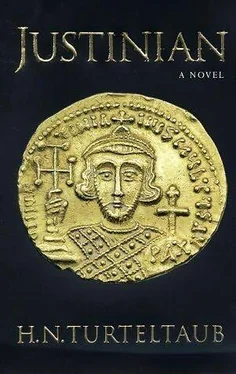Harry Turtledove - Justinian
Здесь есть возможность читать онлайн «Harry Turtledove - Justinian» весь текст электронной книги совершенно бесплатно (целиком полную версию без сокращений). В некоторых случаях можно слушать аудио, скачать через торрент в формате fb2 и присутствует краткое содержание. Жанр: Историческая проза, на английском языке. Описание произведения, (предисловие) а так же отзывы посетителей доступны на портале библиотеки ЛибКат.
- Название:Justinian
- Автор:
- Жанр:
- Год:неизвестен
- ISBN:нет данных
- Рейтинг книги:3 / 5. Голосов: 1
-
Избранное:Добавить в избранное
- Отзывы:
-
Ваша оценка:
- 60
- 1
- 2
- 3
- 4
- 5
Justinian: краткое содержание, описание и аннотация
Предлагаем к чтению аннотацию, описание, краткое содержание или предисловие (зависит от того, что написал сам автор книги «Justinian»). Если вы не нашли необходимую информацию о книге — напишите в комментариях, мы постараемся отыскать её.
Justinian — читать онлайн бесплатно полную книгу (весь текст) целиком
Ниже представлен текст книги, разбитый по страницам. Система сохранения места последней прочитанной страницы, позволяет с удобством читать онлайн бесплатно книгу «Justinian», без необходимости каждый раз заново искать на чём Вы остановились. Поставьте закладку, и сможете в любой момент перейти на страницу, на которой закончили чтение.
Интервал:
Закладка:
The executioner poured a jar of hot vinegar into the bowl. A great cloud of noxious vapor rose from it. Into this vapor the executioner had the excubitores bend Felix's head. He himself, w ith the skill he had learned as part of his trade, forced the recalcitrant bishop to open his eyelids, so that the surface of his eyeballs was exposed to the caustic fumes. Felix howled like a wolf and did his best to twist away. He could not.
After what the executioner judged sufficient time, he let Felix lift his head from the fumes of the boiling vinegar. Felix's whole face was red, as if scorched. His eyes looked as if the executioner had scraped their surface with a file, or perhaps as if they had been rubbed with sand, as a mason will sand down marble to make it smooth. But they were not smooth: on the contrary. I could tell at a glance Felix would not see again.
"Well done," I told the executioner. "Just as I desired." Felix would have been weeping, I think, but no tears flowed from his eyes, which were horribly swollen along with being blistered and abraded. To the excubitores, I said, "Take him to the harbor and put him aboard the ship waiting there to take him to Amastris." Which place, from what Cyrus had said, was as close to living death as made no difference. "He shall never trouble Ravenna again." And off into exile Felix went.
MYAKES
And, a few years later, Brother Elpidios, back from exile Felix came. Once Justinian was cast down, he got his bishopric back, even if he was blind. And do you know what, Brother? He spent a few days at this very monastery before he sailed on toward Ravenna.
I'd only been blind a couple of months myself then. We spent a deal of time talking, he and I did. He told me some useful things, because he'd had longer to get used to it. He'd found, same as I was finding, being in a monastery helps. You go to the same places every day, do the same things. And you don't usually have to fret about where this or that is, because you don't own this and you don't own that, either.
No, I don't know what sort of bishop he made once he got to Ravenna again. I never heard a word about it. Ravenna's a long way from here. For all I know, he might still be bishop. But I'll tell you, Brother, if I've found anything in all these years, it's that I don't know much.
Not long after I blinded Felix and executed the rest of the rebels from Ravenna, Helias came up to me and said, "Emperor, may I talk with you for a little while?"
"What is it?" I asked. By his manner, I judged it was a matter of some importance- and of some delicacy, too.
"Emperor," he said, taking a deep breath, "I don't quite know how to tell you this, but I fear Leo is plotting to steal your throne from you."
If he had thought to gain my attention, he had succeeded. "Do you?" I said. "Why do you think that?"
"It only stands to reason," he answered. "He's too clever for his own good by half, and he's always going around snooping into other people's affairs. I don't like the way he watches me out of the corner of his eye, either."
"All that is as may be," I answered, "but I must tell you that I am glad Leo is diligent in my behalf. I want those who serve me to give me good service. If I have only fools to do my bidding, I shall be in great danger."
"But a clever man will serve himself while claiming to serve you," Helias said.
"You have given me no evidence whatever that Leo is plotting against me, though," I told him. "I cannot condemn him for doing his work too well. If you have any evidence, I will hear it. Until then, do not trouble me with this charge."
Helias bowed and went away. A few days later, a patrician who was called Mauros on account of his extremely black beard came to me with a similar accusation, and with a similar lack of evidence as well. On questioning Mauros, it became clear that he had not plotted his charges along with Helias, but had made them independently.
That two men should devise identical indictments of Leo, neither knowing what the other was doing, made me more concerned about the young spatharios from near Mesembria than either accusation would have on its own. Accordingly, I summoned Myakes and asked him what he thought about Leo.
I had not told him why I sought his opinion. After his usual pause for thought, he replied, "Emperor, if you're asking me whether I like Leo, the answer is no, not very much. But if you're asking me whether he's good at what he does, why, you'd have to be blinder than Felix to say no."
"Yes, I know he's good at his job," I said. "Is his job the only one with which he's concerned?" Seeing that Myakes did not follow, I spelled it out, alpha-beta-gamma: "Does he want mine?"
"Ah, that's what you want to know," he said, enlightenment quickening his features. He thought some more before going on, "If he does, Emperor, I haven't seen it. If I had, I'd tell you in a heartbeat- you know that. If I had, I'd have told you already- you know that, too."
Since he was correct, I thanked him and sent him on his way. No more than two weeks afterwards, the patrician Stephen warned me Leo aspired to my place. Again, I questioned him. Again, he had no solid proof. His claim was unconnected to those of Helias and Mauros, as best I could determine. I dismissed him as I had dismissed them.
His words, however, combined with those of Helias and Mauros, sent me to watching Leo more closely than I had before. In nothing that I saw, in nothing that my privy agents discovered, was the slightest hint of disloyalty. What those agents did discover, however, was an enormous gift for dissembling. Thus, while married, Leo maintained no fewer than three concubines in different quarters of the imperial city, each of them convinced he cherished her alone, as was his wife.
A man capable of such deception was also capable of hatching and nursing plots against me, plots difficult of detection. That he had not done so (or that I had not detected him doing so) proved little. I began to cast about for ways I could be certain his undoubted abilities were used for my benefit rather than to my detriment.
Thanks to the workings of divine providence, such an opportunity was not long in coming. Beyond the northeastern reaches of Roman Anatolia lie the mountains and valleys of the Caucasus. Some of the peoples of this region favor Rome, some incline toward the Arabs' miscalled commander of the faithful, while most back whichever side has given them more presents most recently.
Among the most consistently pro-Roman tribes in the Caucasus is that of the Alans. The followers of the false prophet, however, had recently extended their influence over the Alans' neighbors, the Abasgians. Fearing they would be next, the Alans sent an envoy to me, seeking aid against their neighbors, who now had Arab soldiers alongside them.
"I know the very man to lead your resistance against the deniers of Christ," I exclaimed. "I shall give you my own spatharios, Leo, who by his nature is well suited both to war and to complex bargaining." I spoke with vehemence enough to impress the Alan greatly, nor was I telling him anything less than the truth. "With him I shall send the sum of five thousand nomismata, that he may hire soldiers or make bargains"- a euphemism for pay bribes-"as he sees fit."
"God bless you, Emperor!" the Alan exclaimed. "You have given me and my prince more than we dared expect."
"Leo shall sail for Phasis, the Black Sea port onto which your country opens, no later than next week. I am confident he will do great things for you."
If Leo suspected he was being banished, he gave no sign of it. "I'll tie their tails in knots, Emperor," he said. "Send me after them. I haven't been on that side of the world since I was a little boy, and never up in those mountains." He smiled. "I hear the women in the Caucasus are pretty, too."
Читать дальшеИнтервал:
Закладка:
Похожие книги на «Justinian»
Представляем Вашему вниманию похожие книги на «Justinian» списком для выбора. Мы отобрали схожую по названию и смыслу литературу в надежде предоставить читателям больше вариантов отыскать новые, интересные, ещё непрочитанные произведения.
Обсуждение, отзывы о книге «Justinian» и просто собственные мнения читателей. Оставьте ваши комментарии, напишите, что Вы думаете о произведении, его смысле или главных героях. Укажите что конкретно понравилось, а что нет, и почему Вы так считаете.












